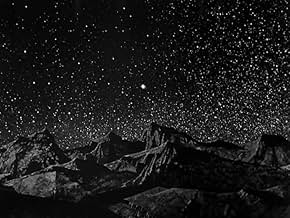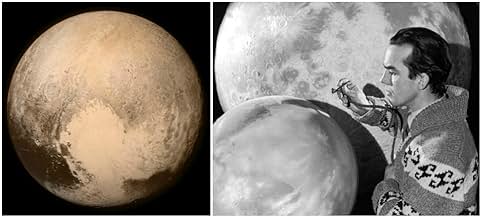A journey through the universe as it would appear to a space traveler beginning at the David Dunlap Observatory on Earth.A journey through the universe as it would appear to a space traveler beginning at the David Dunlap Observatory on Earth.A journey through the universe as it would appear to a space traveler beginning at the David Dunlap Observatory on Earth.
- Directors
- Writers
- Stars
- Nominated for 1 Oscar
- 2 wins & 1 nomination total
Douglas Rain
- Narrator
- (voice)
- (uncredited)
- Directors
- Writers
- All cast & crew
- Production, box office & more at IMDbPro
Featured review
As I watched this, I worked on the assumption that while I don't remember it I'm convinced that I've probably seen it before - as a child in school in the early 1970's. It's a production of the National Film Board of Canada, and NFB films were a staple in classrooms at the time. It's quite short (27 minutes) and it's very hard to rate. One has to try to remember that it was made in 1960. More than 50 years later we know a lot more about the universe than we did then. So perhaps it's unfair to become overly concerned with some of the scientific errors that are made, but having said that - they do stand out to the modern viewer. Things like, "Mars almost certainly has vegetation," or "Venus may have either dense clouds - or dust storms," or "Jupiter has 12 moons." Those things tempt the viewer to simply declare this hopelessly dated and out of touch with modern knowledge. The absence of any commentary about either Uranus or Neptune during the tour of the planets perhaps suggests that not enough was known about Uranus or Neptune in 1960 to even make inaccurate statements. (On the other hand, Pluto is referred to as a "dwarf" - 46 years before the International Astronomical Union got around to downgrading it! You have to give the NFB some credit for its prophetic abilities!) So, as an aid in classrooms studying astronomy, this wouldn't be useful today.
Still, you have to also look at its technical merit and at its message. It makes great and haunting points about the vastness of both space and time - the unimaginableness of such things on a cosmic perspective. That reflection succeeds in putting our little life here on this little planet revolving around this little sun in this one galaxy among countless galaxies into perspective. The closing words, speculating about how many civilizations in the vastness of the universe have risen and fallen reminds us of how temporary are the things that we think of as so important. So if now rendered scientifically inaccurate, it is nevertheless still thought-provoking.
I was somewhat surprised to discover that this film inspired Stanley Kubrick as he worked on "2001: A Space Odyssey." It's therefore made a lasting contribution to the genre of science fiction - although science fiction was certainly not what the NFB was going for.
The narration in this could have perhaps been a bit more dramatic; a bit more exciting - although it's pretty typical for what I can remember of NFB films. They didn't go for excitement or drama; they dealt with their subject matters in very formal and official sounding tones. So while I may think this would have benefited from a lively narrator, this was undoubtedly what the NFB was going for.
While I admire its technical merits, and the lasting impact that it had, I can't get over the fact that, based on the purpose for which it would originally have been made, it's now rather useless. So it only gets a 6/10 - but it's nevertheless well worth watching.
Still, you have to also look at its technical merit and at its message. It makes great and haunting points about the vastness of both space and time - the unimaginableness of such things on a cosmic perspective. That reflection succeeds in putting our little life here on this little planet revolving around this little sun in this one galaxy among countless galaxies into perspective. The closing words, speculating about how many civilizations in the vastness of the universe have risen and fallen reminds us of how temporary are the things that we think of as so important. So if now rendered scientifically inaccurate, it is nevertheless still thought-provoking.
I was somewhat surprised to discover that this film inspired Stanley Kubrick as he worked on "2001: A Space Odyssey." It's therefore made a lasting contribution to the genre of science fiction - although science fiction was certainly not what the NFB was going for.
The narration in this could have perhaps been a bit more dramatic; a bit more exciting - although it's pretty typical for what I can remember of NFB films. They didn't go for excitement or drama; they dealt with their subject matters in very formal and official sounding tones. So while I may think this would have benefited from a lively narrator, this was undoubtedly what the NFB was going for.
While I admire its technical merits, and the lasting impact that it had, I can't get over the fact that, based on the purpose for which it would originally have been made, it's now rather useless. So it only gets a 6/10 - but it's nevertheless well worth watching.
Storyline
Did you know
- Trivia'Stanley Kubrick' viewed this film and was used as a template for the special effect shots used in his 2001: A Space Odyssey (1968). He used the same panning camera effect for creating his planets. He even hired narrator Douglas Rain to voice the computer HAL.
- ConnectionsEdited into 50 for 50: Volume 1, Tape 3: Animation: Reflections (1989)
Details
- Release date
- Country of origin
- Language
- Also known as
- Der Himmel über uns
- Filming locations
- Production companies
- See more company credits at IMDbPro
- Runtime29 minutes
- Color
- Sound mix
- Aspect ratio
- 1.37 : 1
- 1.66 : 1
Contribute to this page
Suggest an edit or add missing content


















